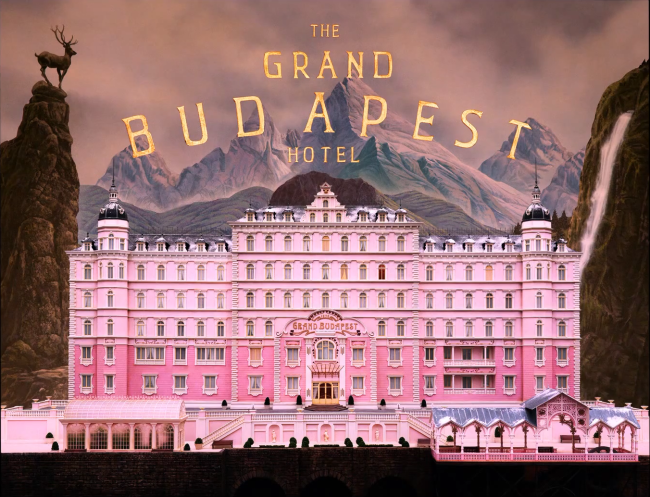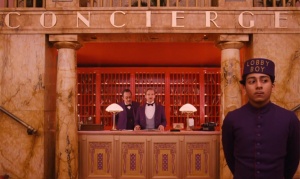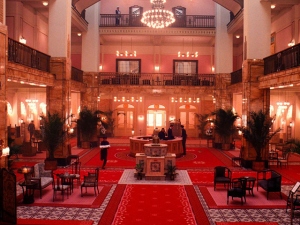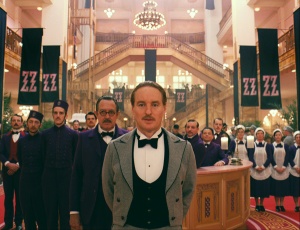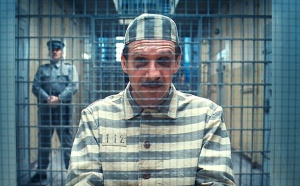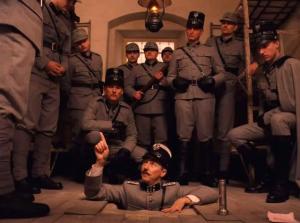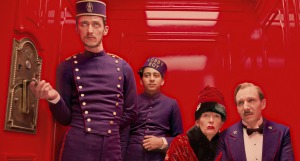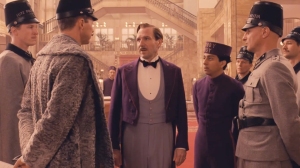Director: Wes Anderson
Writer: Wes Anderson
Stars: Ralf Fiennes, F. Murray Abraham, Mathieu Amalric
Wes Anderson’s latest film is out, and I, like many other fans, rejoiced in its arrival. And I continued in this rejoicing until I left the theater. Only now, after the irresistible glow of the Wes Anderson World has worn off, do I begin to have some doubts. (But we’ll save those for later.)
The Grand Budapest Hotel tells the story of Monsieur Gustave H, a charismatic concierge played by Ralph Fiennes (whose delivery resembles a younger Steve Martin in his role). Joined by his trusty lobby boy, Zero, M. Gustave embarks on a series of adventures set in and around a European hotel of the same title. But the film’s “story” is more like a fairy tale, tied together by enchanting visuals and numerous flashbacks.
We open in the present day: a girl holds a book entitled The Grand Budapest Hotel, while visiting the burial site of its author. We are then taken to the late ’60s, where Young Writer (Jude Law) interviews the aforementioned Author. Now, we wait for the “real” story to begin, until finally, the curtain opens to reveal the Grand Hotel.
In true Wes Anderson fashion, the attention to detail is exquisite. It is the 1930s, a time of political and economic turmoil, but we are in a flourishing palace. Everything is doll-house decadent. Lush red carpets line the floors and elderly women in fur coats drink champagne. It’s how I would imagine The Overlook Hotel in The Shining during peak season of the Roaring 20s. Every frame itself is grand; wide angle shots of the hotel lobby and surrounding mountainous landscapes take in even the tiniest of details. The stimulus is practically overwhelming. But, it quickly becomes clear that everything is not peaches and cream. The land is ruled by a fascist regime, identified by their insignia, “ZZ,” whose presence clouds over the hotel’s idyllic rays of sunshine. Yet, even the darkness comes with a sense of charm.
All of the components of the “typical” Wes Anderson film are in place here. There is the intellectual man on a mission, or in this case, two men: M. Gustave is evocative of Rushmore‘s Max Fischer or even Mr.Fox, and Zero of Moonrise Kingdom‘s Sam. There is the calm, cool and collected love interest, Agatha, like Moonrise Kingdom’s Suzy (surprise) or The Royal Tenenbaums‘ Margot. There is wit, awkwardness and insouciance. There are chapters and title cards.
These chapters lend themselves to a story, more or less. The central conflict: Gustave H. steals a priceless painting that belonged to his deceased lover, and must now face the police– as well as an intimidating private investigator– all while upholding his own style and personal integrity. Oh, and the nation is at war.
The plot, however, seems to be simply a vehicle for the director’s imagination, an exercise in artistic license. How else could there be both an alpine ski chase and a furious shoot-out in a span of several minutes? (Not to mention the absurd number of cameos.) Unfortunately, the cohesiveness of the script took a bit of a hit from all of the bells and whistles of the film. Truth be told, the humor ran a bit dry– most of the punchlines are featured in the trailer– and this came as a disappointment. The Grand Budapest is, after all, Anderson’s first solo screenplay, and yes, it shows. There seemed to be something missing; the director’s quick cleverness is muddled by his through-the-roof aesthetic ambitions. It brings to mind The Life Aquatic, but with a more solid entertainment factor.
Regardless, The Grand Budapest Hotel marks a turning point in Anderson’s career. Following in the footsteps of directors like Woody Allen and even Tarantino, Wes Anderson’s films are almost instantly recognizable. He has truly created a genre of his own. Much like Woody Allen’s films, there seems to be an autobiographical tone present in the script. M. Gustave recites verses of romantic poetry and is scrutinized for his odd behavior and apparently flamboyant facade. He is daring and ambitious. He dismisses critics. Of course, all of this could be coincidental.
Either way, The Grand Budapest Hotel tells us one thing for sure: the director has put his foot down. And he’s not budging, whether we like it or not.
